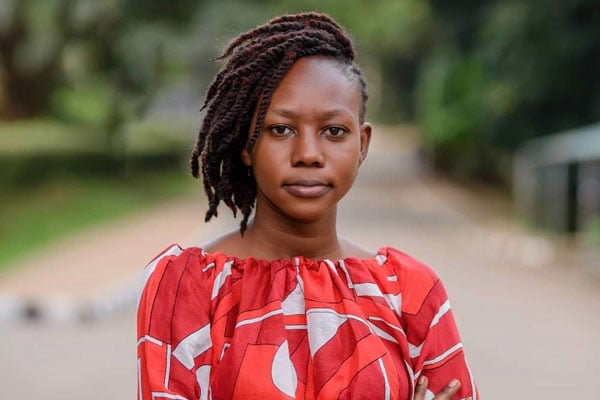Prime
How new marriage Bill will affect you

Tororo Woman MP Sarah Opendi speaks during plenary at Parliament on May 16, 2023. PHOTO/DAVID LUBOWA
What you need to know:
- Ex-minister Sarah Opendi proposes in a Bill she is yet to table for House consideration to reform the marriage law, arguing that individuals living together for at least six months should automatically be recognised as a legal couple.
Tororo District Woman MP Sarah Opendi has proposed that cohabiting individuals should automatically be recognised as legally married after living together for at least six months.
The suggestion, which immediately drew polarising views from a section of the public, is among a raft of proposals in a Private Member’s Bill titled “The Marriage Bill, 2022”, which the legislator is yet to table.
Parliament authorised her to bring a Bill in renewed efforts to reform what Ms Opendi described as antiquated marriage law and the need to consolidate piecemeal legal provisions about the institution into one volume.
Previous attempts by the House to change the marriage legislation have gone nowhere, with parliamentarians divided on, among others, definition of marriage, legal protections to parties, property ownership and sharing in the event of divorce.
Variations in customs among Uganda’s different tribes regarding marriage and evolving individual preferences and spiritual beliefs of prospective couples have meant little or no uniformity in standard marriage rites.
In some cultures, payment of bride wealth or visit by a man to gift parents or relatives of a woman constitute adequate fulfilment for traditional marriage. For the religious, marriage is incomplete until the couple weds.
In defence of her proposal, Ms Opendi, who previously served as Uganda’s junior Health minister, argued that it is unacceptable and disrespectful for a man to live with someone’s daughter without fulfilling customary obligations.
“Why would you want to live with somebody’s daughter without even appreciating the parents? Why?” she said, “Supposing that was your daughter and a man starts producing [children] with her without even alerting the father, would you be happy with it?” she argued.
She claimed that roughly, seven in every 10 couples are cohabiting, which she argued should last for a maximum 6-24 months.
Ms Opendi dismissed the argument that lack of means to pay bride wealth is forcing many men to delay or forego marriages.
“It is not just about wealth,” she said.
In a rejoinder yesterday, Amolatar District Woman MP Agnes Atim Apea said marriage is a decision and “I do not think legislation can help in this kind of subject”.
Ms Isabel Nicole Atai, who identified on twitter as a law student at Makerere University, was blunt.
“What if I want to cohabit? I thought marriage is entered in with the free consent of both parties,” she noted.
Past efforts to change the marriage legal regime in Uganda have run into a conundrum because different laws in the country provide for different types of marriages, among them, customary, civil, church, Hindu and Muslim marriages.
For this reason, the Inter-Religious Council of Uganda’s secretary general Joshua Kitakule withheld comments on the merits and demerits of the Opendi proposal, terming it a “discussion is for secular marriage and we have no business opposing it”.
Rt Rev Onesimus Asiimwe, the new bishop of North Kigezi Diocese, said cohabiting is unbiblical marriage is God-ordained and “the way God intended it [is] supposed to be between a man and a woman, both biologically and anatomically male and female, in a lifelong relationship.
Proponents of a reformed marriage law argue that it is necessary to protect the rights of the parties, particularly the women who in the event of a breakup, often walk away empty-handed after years together.
In April, the High Court in Kampala ruled that cohabitation was not a marriage and each party’s claims to property should be premised on proof of “financial contribution or joint ownership of the disputed property as joint tenant or tenants in common”.
According to the Justice Centres Uganda (JCU), a government Justice, Law and Order Sector (JLOS) project supervised by the Judiciary, “a marriage exists only if they (parties) formalise their relationship under any of the recognised types of marriage”.
“It does not matter how many years a man and a woman have been living together or the number of children that they have,” information on JCU website reads in part.
Mr Stephen Masiga, a Kampala resident, voiced support for MP Opendi’s proposals, arguing that her critics “don’t consider marriage an important institution”.
“Cohabitation isn’t marriage, poverty shouldn’t be an excuse, and parents being aware doesn’t make it legal,” he said.
In comments on microblogging site, a one Samuel Mukama countered that the “life-time seal” of marriage “is in the love and minds of [the couple], not on paper (marriage registration)”.





